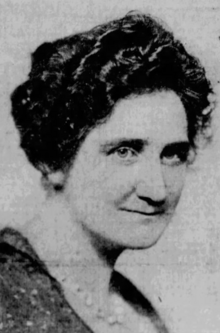Florence E. Ward
Florence Elizabeth Ward (February 1871 – February 23, 1934) was an American educator and government official. After a career in academia focused on Kindergarten education, she became an official in the United States Department of Agriculture, addressing the needs of rural women as Eastern Division head of the USDA's Office of Cooperative Extension Work.
Early life and education
[edit]Ward was born in Mauston, Wisconsin, the daughter of Lemuel J. Ward and Elizabeth (Libby) Harrington Ward. Her father was a Union Army veteran of the American Civil War. She graduated from the National Kindergarten College in Chicago in 1903. She studied with Maria Montessori in Italy.[1]
Career
[edit]Ward taught at Iowa State Teachers College.[2][3] She was the first president of the Iowa Kindergarten Union in 1908.[4] In 1914 she was chair of the National Kindergarten Association, and traveled in Europe to study school conditions abroad.[5] She was briefly a professor of vocational education at Washington State University.[6][7]
Ward left academia to work on the federal food conservation programs during World War I.[8] She was head of the Eastern Division of the Office of Cooperative Extension Work, a program of the United States Department of Agriculture (USDA).[1][9] She supervised a survey concerning the lives of farm women in 1919.[10][11] She gave lectures on her work at conferences[12][13] and on national radio broadcasts, including "New Social Horizons of the Farm Woman" (1929).[14]
Publications
[edit]- The Montessori Method and the American School (1913)[15]
- "Extension Work with Farm Women" (1916)[16]
- "Finer Home-Making: The Farm Woman and 'Extension'" (1926)[9]
- "Home demonstration work under the Smith-Lever Act, 1914-1924" (1929)[17]
- "How to find economic facts and apply them as a basis for extension programs in home economics, dairying, and forestry" (1929)[18]
Personal life
[edit]Ward lived in Alexandria, Virginia. She died from double pneumonia in 1934, at the age of 62, at Garfield Hospital in Washington, D.C., shortly after attending the dedication of a memorial to Martha Van Rensselaer at Cornell University.[1]
References
[edit]- ^ a b c "Ward, Florence E." Special Collections and University Archives, University of Northern Iowa. Retrieved 2024-09-16.
- ^ Moriarty, Edith (1922-08-18). "With the Women of Today". The Capital Times. p. 8. Retrieved 2024-09-16 – via Newspapers.com.
- ^ "Educators of Today". Journal of Education. 92 (6): 157. August 26, 1920. doi:10.1177/002205742009200610 – via Internet Archive.
- ^ "First State Meeting; The Iowa Kindergarten Union Holds its First Meeting". Cedar Falls Gazette. 1908-06-05. p. 1. Retrieved 2024-09-16 – via Newspapers.com.
- ^ "Teachers' Institute Here Next Week". Manchester Democrat. 1914-09-16. p. 1. Retrieved 2024-09-16 – via Newspapers.com.
- ^ Buchanan, Anna (1915-05-28). "Women's Vocational Conference at the Washington State College". The Spokesman-Review. p. 5. Retrieved 2024-09-16 – via Newspapers.com.
- ^ "Iowa Women Will Regret Removal of Florence E. Ward to Pullman, Wash". The Courier. 1915-03-12. p. 7. Retrieved 2024-09-16 – via Newspapers.com.
- ^ "Hoover Chooses Food Assistants". The Sioux City Journal. 1917-08-20. p. 1. Retrieved 2024-09-16 – via Newspapers.com.
- ^ a b Ward, Florence E. "Finer Home-Making: The Farm Woman and 'Extension'" The Woman Citizen 10(11)(February 1926): 21-22.
- ^ Ulm, Aaron Hardy (July 7, 1920). "The Farm Wife Discovered". The Outlook. 125: 455–456 – via Internet Archive.
- ^ "Farm Woman Works Eleven Hours A Day; Survey Among 10,015 Homes Shows That 87 Per Cent Have No Regular Vacation". The New York Times. July 6, 1920. p. 28. ISSN 0362-4331. Retrieved 2024-09-16.
- ^ "News from the Field". The Journal of Home Economics. 9 (8): 391. August 1917 – via Internet Archive.
- ^ "The Rural Life Luncheon". Child Welfare Magazine. 23 (11): 621. July–August 1923 – via Internet Archive.
- ^ Ward, Florence E. (1929). New social horizons of the farm woman. National Broadcasting Company, U.S. Department of Agriculture.
- ^ Ward, Florence Elizabeth. (1913). The Montessori method and the American school. New York: Macmillan company.
- ^ Ward, Florence E. "Extension Work with Farm Women: In the Office of Extension Work, North and West" Official Proceedings of the Thirty-Sixth Annual Session of the Farmers National Conference of the United States (1916): 188-190.
- ^ Ward, Florence E. (1929). Home demonstration work under the Smith-Lever Act, 1914-1924. Washington, D.C: U.S. Dept. of Agriculture. OL 25513005M.
- ^ Ward, Florence E. (1929). How to find economic facts and apply them as a basis for extension programs in home economics, dairying, and forestry. National Agricultural Library U. S. Department of Agriculture. Washington, D.C. : U.S. Dept. of Agriculture.

